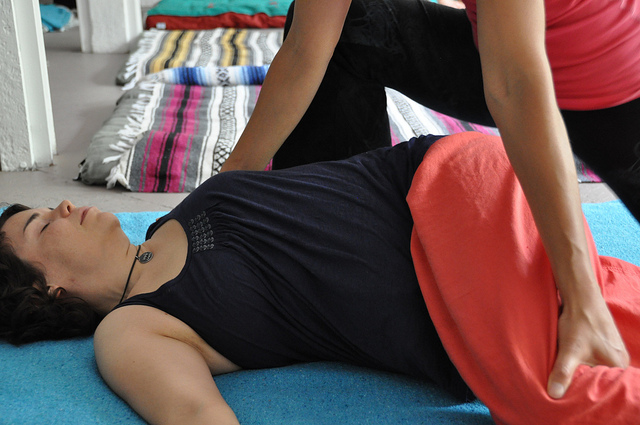I spend a lot of time in yoga studios as a student, an assistant and as a teacher. I’m probably in class 15 times a week on average.
Yes, 15 classes a week. Some weeks 20. Very, very rarely fewer than ten.
So besides the fabulous asana practice, I also get to experience a whole lot of dharma, and I gotta say, yoga teachers say a lot of shi-, uh, stuff, in class.
“Inhale and reach for what you want”
“Exhale and send your intention out to the universe.”
“Notice the sensation and do not react.”
“We can only receive that which we give first.”
“Where else does this show up in your life?”
“Let your breath hold you here in this [twisted] pose.”
“This practice is a cultivation of strength that will carry you off your mat and into your life ” (my signature line, btw)
“Stay through the shaking; the shaking is weakness leaving your body.”
When I’m practicing and I hear this, I think my teachers are enlightened geniuses and I am certain they are speaking directly to me. Because for sure they are.
When I’m assisting, I objectively listen and consider how to best support the students considering what emotions might be triggered by the combination of music, poses and the dharma.
When I’m teaching, I hover between the occasional authentic and powerful share and total and complete bullshit.
Yes. Bullshit.
I mean, sometimes the crap that comes out of my mouth is not only a complete and total surprise, even to me, but also…it doesn’t even make any f*cking sense.
Like today, for example, I prompted students to shine their hearts forward in gratitude.
Ummmm. How might one do that, exactly?
Like, is that a halfway lift? Cobra? Maybe Dhanura-asana (bow pose)?
What the hell does “shine your heart” mean? Honestly, can I not think of anything better than this to say? For real?
Granted, every single student knew exactly what I meant, and when I hear that cue when I’m practicing damn it all if I don’t shine my little heart with all the positive intentions and gratitude that exists in my body.
But still, it sounds a little cheesy when I say it. Inauthentic. Forced.
I’m still working on how to share authentic dharma during class which is frustrating because I have zero problem writing about it from a place where I can hide safely behind my computer screen. I haven’t even the slightest hesitation to speak publicly about it. But, step (barefoot) into my shoes as a yoga teacher and suddenly I feel…inadequate.
Unqualified. Subpar. Confused.
Frozen.
I wonder: how do I speak from my heart while at the same time focusing on and connecting with students? How can I personalize my share without making it all about me? Where is the balance between a meaningful share versus a self-serving personal growth monologue? If I have an aha moment, can I offer the wisdom gleaned from it without taking students out of their own practice right into my mind and my issues?
So, in an attempt to get a grip on this whole concept I try to stick to these general parameters when sharing:
- Keep it real. Don’t share something I don’t do, believe or practice. That is a guaranteed way to come off as a poser.
- Speak to what’s happening in the room. Not what’s happening with me, what’s happening in the room. Are the students sleepy looking? Restless? Having a difficult time in balancing poses? What kind of suggestions can be offered to improve their practice?
- Sprinkle it in. Throw a few phrases here and there, weaving it into the practice so as the story unfolds it feels natural, instead of an anticlimactic share during hip openers.
- Hold space. The teacher’s presence in and of itself creates an impact. Words can either be an addition or a subtraction from the asana. Choose them wisely.
- Keep it short and simple. Really. Less is more, even so much as:
- If nothing genuine comes to mind, share a short yoga axiom such as “everything is connected” then shut the hell up and leave them alone.
As I become more comfortable in my own (ever-evolving) skin, my ability to offer more impactful words will improve. The more grounded I become, the more grounding I can offer. The more experience I have, the better I can make the experience of others.
It is in pursuit of growth, for teacher and students, that we journey on together. And, remember, as Rumi said,
“Words are a pretext. It is the inner bond that draws one person to another, not words.”
Love elephant and want to go steady?
Sign up for our (curated) daily and weekly newsletters!
Author: Michelle Sweezey
Editor: Renée Picard
Photo: Melissa Smith at Flickr



Read 3 comments and reply